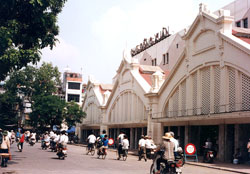The renowned Dong Xuan Market in downtown Hanoi has long been a favorite place for Hanoians and Vietnamese and foreign visitors to the city to shop.

A long time ago there were two centers of sales activity (markets) in the Old Quarter, one next to the Cau Dong Pagoda on Hang Duong Street and the other next to the Bach Ma Temple on Hang Ma Street. In 1889 French city planners filled the To Lich River and the Thai Cuc Lake and closed down these two markets. The traders then moved about 150 meters away to what was an unoccupied place in Dong Xuan ward, Hoan Kiem district. This new open air market was called Dong Xuan Market.
A short time afterward, a 6,500 square meter covered marketplace was built on the site which had five elegant iron arches reminiscent of Notre Dame Cathedral in Paris that face the road and a roof of zinc-coated sheet iron.
Situated close to the river port, trade at the market was brisk. Initially, goods sold at the market were mainly farm produce grown along the northern side of the Hong (Red) River. Dong Xuan Market later became a busy trade center that attracted buyers from France, Spain, India and other countries.
The market is now the biggest wholesale market in the capital. At the market one can find electronic products, home appliances, garments and fabric. Along the back wall live pet animals are also sold. Dong Xuan is always crowded.
A night market now takes place along one street which changes name from Hang Ngang to Hang Dao midway. It was created in recent years to attract more people to the old quarter. Here one can find both expensive and cheap items, and also interesting souvenirs. Along the edges of the night market on the sidewalk one can sample Vietnamese traditional foods like bun and pho (noodles with meat and vegetables). The night market attracts locals and foreigners alike.
If you plan to stick around until the end of the year, you might at that time look for a new book, 'Hanoi Markets - Past and Present' that has contributions from 20 folk culture researchers. The 500 page book was put together to mark the 1000th anniversary of Hanoi that will be celebrated in 2010.